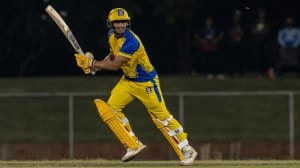Abetment of suicide charges should not be ‘mechanically’ invoked: What SC said, why
What are the ingredients for an abetment to suicide charge? What is the bar set by the SC for prosecuting such cases?
 The Supreme Court on Thursday said that abetment of suicide charges should not be ‘mechanically’ invoked. (Express Photo by Amit Mehra)
The Supreme Court on Thursday said that abetment of suicide charges should not be ‘mechanically’ invoked. (Express Photo by Amit Mehra)The Supreme Court on Thursday highlighted the need to sensitise investigation agencies and courts in abetment of suicide cases under Section 306 of the Indian Penal Code, 1860 (IPC).
A Bench of Justices Abhay S Oka and K V Viswanathan stated that “It is time that investigating agencies are sensitised to the law laid down by this Court under Section 306 IPC so that persons are not subjected to abuse of process of a totally untenable prosecution”.
It further added that “while the persons involved in genuine cases where the threshold is met should not be spared, the provision (S.306 IPC/S.108 BNS) should not be deployed against individuals only to assuage the immediate feelings of the distraught family of the deceased”.
The apex court made this statement while clearing charges against a bank manager accused of abetting the suicide of a man who allegedly took his own life after he was unable to repay his bank loans.
What are the ingredients for an abetment to suicide charge? How did this case reach the Supreme Court? Have courts set a standard for prosecuting such cases?
Abetment of suicide in criminal law
The term “abetment” is defined under Section 107 of the IPC, which is the same as Section 45 of the Bharatiya Nyaya Sanhita, 2023 (BNS).
A person abets the doing of a thing, if she (i) instigates any person to do that thing, or (ii) engages with one or more others in a conspiracy for the doing of that thing, or (iii) intentionally aids, by any act or illegal omission, the doing of that thing.
To prove abetment of suicide, one has to effectively show that the accused directly instigated or aided the deceased to die by suicide. The punishment for abetment of suicide provided under Section 306 IPC (Section 108 BNS) can be up to 10 years imprisonment along with a fine.
According to the National Crime Records Bureau’s annual Crime in India report, the conviction rate in abetment of suicide (Section 306 IPC) cases was 17.5% in 2022, the year for which the latest data are available. For comparison, the overall conviction rate for all crimes under the IPC was 69.8%. It was 54.2% for cognizable offences — which includes abetment to suicide — where an arrest can be made without a warrant.
The case before the Supreme Court
According to the facts presented by the police, the deceased person died by suicide on October 11, 2022. He left behind a suicide note stating that he was being harassed by the accused bank manager to repay his loans. On the basis of this information, the police registered a case against the bank manager under Section 306 of the IPC.
Once the investigation was complete, a trial court in Madhya Pradesh framed charges under Section 306 against the accused on February 28, 2023. The bank manager challenged the order framing the charges before the Madhya Pradesh High Court shortly thereafter, stating that the ingredients for abetment under Section 107 were absent in this case.
The HC on July 25, 2023, however, rejected the plea and allowed the trial to proceed. It held that there was a prima facie case against the bank manager as the deceased in the suicide note “has clearly made allegations of harassment by the applicant repeatedly and the deceased was mentally tortured by the present applicant on the pretext of recovery of loan”.
In September 2023, the bank manager approached the Supreme Court challenging both the trial court and HC rulings. A Bench of Justices Oka and Pankaj Mithal ordered a halt to the trial court proceedings.
On January 15 this year, the apex court discharged the bank manager, highlighting that such cases “should be approached from a practical point of view and not divorced from day-to-day realities of life”. The SC added that “hyperboles and informal exchanges without anything more should not be glorified as an instigation to commit suicide.”
The court also criticised the approach of trial courts in such cases, stating that the court “should not adopt a ‘play safe’ syndrome to mechanically frame charges even when investigating agencies have shown utter disregard for Section 306 IPC”.
The standard for abetment of suicide
In October 2024, the Supreme Court quashed the case of abetment of suicide in which a salesperson died by suicide after alleged harassment from senior officers in his company who were forcing him to opt for a voluntary retirement scheme. The SC said that police and the courts should avoid “unnecessary prosecutions” in cases of abetment of suicide stemming from the workplace.
A Bench of Justices J B Pardiwala and Manoj Misra stated that the bar for proof would be higher in cases where the deceased and the accused have an official relationship (such as between an employer and employee), and both the courts and prosecuting agencies must see if there is evidence to show that the accused intended to cause the suicide. The court also held that there must be “direct and alarming encouragement/ incitement by the accused” to prosecute someone for abetment to suicide.
The requirement for direct evidence can be found in other SC cases as well. In M Mohan v The State (2011), the SC set a high bar for proving abetment of suicide under Section 306 IPC, including specific intent — it “requires an active…or direct act which led the deceased to commit suicide seeing no option and this act must have been intended to push the deceased into such a position that he/ she committed suicide”.
This standard was upheld in Ude Singh v State of Haryana (2019) as well, where the SC stated “There must be a proof of direct or indirect act(s) of incitement to the commission of suicide”. However, the court also clarified that “if the accused by his acts and by his continuous course of conduct creates a situation which leads the deceased perceiving no other option except to commit suicide, the case may fall within the four corners of Section 306 IPC.”
- 01
- 02
- 03
- 04
- 05






































